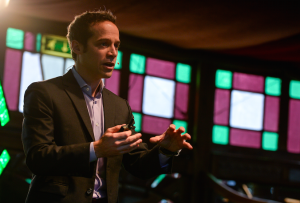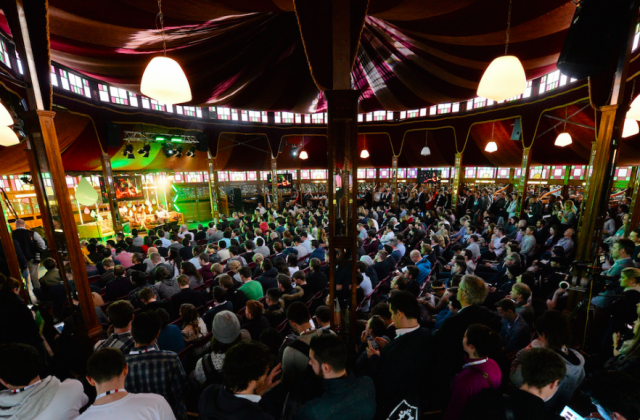Stats and Spiegeltents. Day 1 at the Sports Summit.
Web Summit 2014 saw a new addition: the Sports Summit. The stage, set in a Spiegeltent, was the scene of talks and presentation on various aspects of sports. Social media, statistics and sport tech were all covered, along with some non-digital aspects such as the role of amateurism in today’s games. Such a conference happening on my doorstep was obviously appealing.
Over the two days of the Sports Summit the numbers in the audience ebbed and flowed much like a music festival, perhaps befitting the very un-tech-like venue. It was standing room only for Simon Kuper‘s chat with Bill James, just as it was for the skateboard great Tony Hawk whose chat with David Epstein concluded proceedings on the Wednesday. Those big crowds paled into insignificance however compared to the queues that formed to steal a glimpse of former Manchester United and England defender Rio Ferdinand, interviewed by ESPN’s Jeremy Schaap.
A quick dance through two days of sports chat:
David Epstein, investigative journalist formerly of Sports Illustrated, now of Propublica and author of The Sports Gene, bookended the Sports Summit with an opening presentation on Tuesday morning and his chat with Tony Hawk to close out the Wednesday. Epstein is a naturally engaging speaker and his presentation, covering the importance of looking at “small data”, “trainability”, and the dangers of early sports specialisation in children rattled along nicely. I’ve spoken before of my instinct that kids playing multiple sports is a good thing, perhaps a natural advantage that we have in Ireland where GAA, hurling, soccer and rugby are available to so many. In the US big cities no longer produce big stars, said Epstein. The small town athlete, more likely to play every sport available, is more likely to make it to the top.

David Epstein talking at the Sports Summit 2014. Credit: Diarmuid Greene / SPORTSFILE / Web Summit
Emily Glen spoke of the disparity between male and female sport, from the point of view of funding, sponsorship and media coverage. There were not many female speakers on the Sports stage over the two days – just four in the schedule of 33 sessions: Emily Glen, Anastasia Ashley (professional surfer), Emily Steel (New York Times) and Ciara Byrne (Fast Company). Few women speaking, many men. It’s a talking point that pops up a lot at panel-based events, everything from conferences to Sunday morning radio shows.
The Evolution of Broadcasting, moderated by Emily Steel, had on it one Amory Schwartz. Later that day I bumped into a current Leinster player who had been at that panel and asked me about Schwartz’s background. “He’s the guy who founded NASN“, I told him. The rugby man nodded sagely. NASN was the North American Sports Network, the precursor to ESPN’s presence on our TV screens here in Ireland and the UK. Schwartz talked a bit about this on the panel, saying that when first setting up the channel the rights fees for MLB and NHL games were absurdly cheap. Fifty thousand dollars for the first year of NHL games, said Schwartz. And when they went back four years later, the NHL asked for 45 million.

Amory Schwartz talks at Sports Summit 2014. Credit: Diarmuid Greene / SPORTSFILE / Web Summit
Ed Lodge and Martin Weekes were at the Sports Summit from New Zealand. Their company, CSx, is trying to use data to assist in the understanding of concussions. It’s centred around a small chip, perhaps 1cm * 2cm * 0.5cm, that’s placed behind a player’s ear. Any sudden movement of the head, both forwards/backwards and rotational, can then be relayed to an app. The data can then be used to inform a sideline whether a player might need to be looked at or, after the fact, the data can be used to inform a trained medical person as to the precise head movement mechanism of the injury.
Ben Green, podcast producer at The Guardian, was a good participant in The Content of Sport. He said that The Guardian are in talks with third party apps to insert dynamic advertising into podcasts (it’s currently hard coded). In the US things are a little different – the podcaster will typically do a lot of “live reads”. Why the difference? Well, Green said, US audiences more conditioned to hearing “and now a word from our sponsor”. He talked about the rise of informed analysis, even affecting programs like Match of the Day. People are getting tired of bland analysis, said Green.
The final session of day 1 was the chat between Simon Kuper and Bill James. It was heavily attended, as might have been forecasted. In this age of so much data, will it be harder to find an advantage? ”
“There will never be a shortage of ignorance”, said James. “There will always be things we do not know”.

Bill James & Simon Kuper, Sports Summit 2014. Photo Credit: Andy McGeady
When finding interesting things in data or statistics, what does James say to people who won’t accept the findings? His view was simple – never argue. Ignore people who disagree with you or criticise you. “The people you can reach are the people who are listening”. James says he gets many coaches, tanned from a life spent outside in the sun watching baseball, telling him that they had always followed his work and were using elements of it years ago. “They sure kept quiet about it at the time”, said James who had been famously kept at arm’s length by the mainstream baseball industry for so many years.
It was a fascinating discussion, Kuper probing here and there and James giving glimpses of a contrarian nature. One got perhaps a sense of frustration in James, that in moving into the Boston Red Sox organisation he no longer has a chance to write freely about the game he loves. He’s written about murder now, and he continues to write. He has a website that “charges $3 a month to keep the riff raff out”, and he’s writing a book about a criminal of about 100 years ago. A dreadful, compelling and unusual story, apparently. And his ambition has not dimmed. But, as he said himself, as he gets older the ratio of energy to ambition is perhaps not what it once was.
Next up: Day 2


Please let me know if you’re looking for a article writer for
your blog. You have some really good articles and I feel I would be a good asset.
If you ever want to take some of the load off, I’d absolutely love to wrdite some materrial for your blog in exchange
for a link back to mine. Please blast me an email if interested.
Thanks!